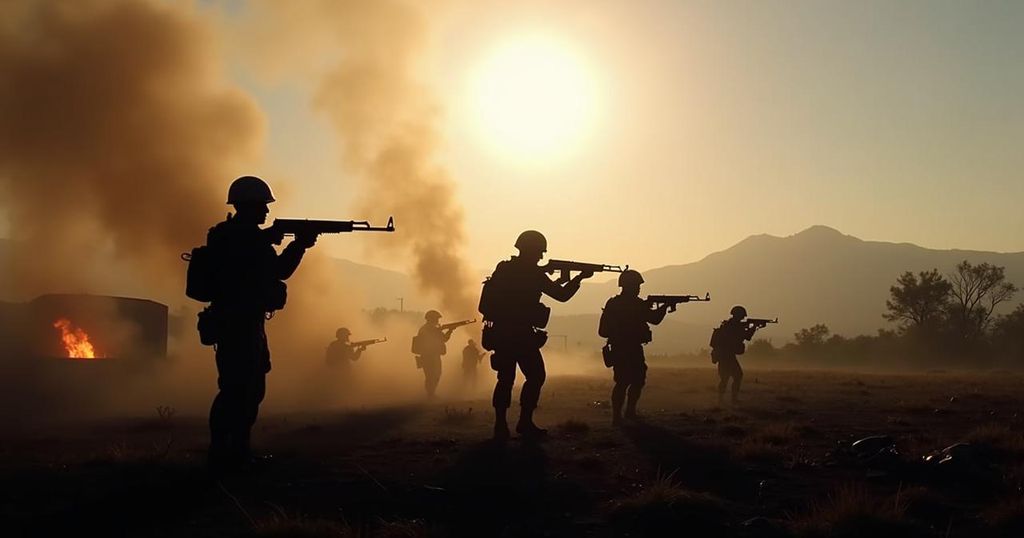Tragic Shooting of Migrants by Mexican Military: A Call for Accountability

On Tuesday, six migrants were killed and ten injured near the Guatemalan border when Mexican army soldiers opened fire on their truck. The incident has sparked outrage, particularly from Peru, and prompted calls for investigations into the army’s actions. It highlights the ongoing challenges regarding migrant safety and human rights amidst Mexico’s militarized immigration policies.
In a tragic incident on Tuesday, six migrants lost their lives when Mexican military troops opened fire on a truck transporting individuals from various nations, including Egypt, Peru, and El Salvador, near the Guatemalan border. The shooting, described as “deplorable” by President Claudia Sheinbaum, occurred in the southern state of Chiapas, close to the town of Huixtla. In addition to the fatalities, ten other migrants sustained injuries in the attack, which has prompted outrage and calls for investigations from affected nations, particularly from Peru’s Foreign Ministry, which confirmed the death of one of its citizens and demanded an immediate inquiry. Reports indicated that soldiers, claiming to have fired in response to shots heard, mistakenly targeted one of the three trucks in a convoy. Further confusion surrounded the incident; while the soldiers stated the first truck fled, they engaged another vehicle, resulting in the deaths of four migrants and further fatalities among the wounded. Local authorities confirmed the victims sustained gunshot wounds, yet it remains unclear if these were inflicted by the army, with Sheinbaum withholding information regarding any weapons found among the migrants. This shooting incident marks one of the most severe cases of violence directed at migrants by authorities in Mexico since a notorious case in 2021, when police in Tamaulipas killed 17 migrants. President Sheinbaum has stated that the two soldiers involved will be subjected to civilian prosecution, highlighting her administration’s commitment to accountability in cases of misconduct. Nonetheless, the incident has drawn significant criticism, with the Mexican Council of Bishops labeling the actions as a “disproportionate use of lethal force,” attributing the tragedy to the militarization of immigration policy at the southern border. The area has a history of both migrant smuggling issues and violent confrontations between drug cartels, making the situation complex. Activists and observers, such as migrant rights advocate Irineo Mujica, question the soldiers’ claim of being fired upon, suggesting that migrants typically avoid confrontation due to the dangers involved. If determined that the army fire caused the migrant deaths, President Sheinbaum could face significant political ramifications, particularly given her administration’s reliance on military forces for law enforcement and migration control. This event underscores ongoing challenges regarding human rights and military involvement in conflicts at the border, with many advocating for serious changes in policy to prevent further tragedies.
The issue of migrant safety in Mexico has become increasingly concerning, particularly regarding the involvement of military forces in immigration enforcement. The historical context includes previous incidents where military and police have engaged with migrant populations, often leading to violent outcomes. This incident occurred in a region notorious for drug trafficking and smuggling activities, complicating the dynamics between local authorities and migrants. The militarization of border policy has been criticized as a factor contributing to increased violence against vulnerable populations seeking refuge or a better life.
The shooting of six migrants by Mexican army troops sheds light on the grave dangers faced by migrants in transit, compounded by the increasingly militarized approach to immigration enforcement in Mexico. This incident has provoked urgent calls for accountability and a thorough investigation, as well as questions surrounding the treatment of migrants in the face of escalating violence. The political implications for President Claudia Sheinbaum could be substantial, as both domestic and international pressures mount to reevaluate current policies regarding human rights and military engagement with civilians.
Original Source: abcnews.go.com






